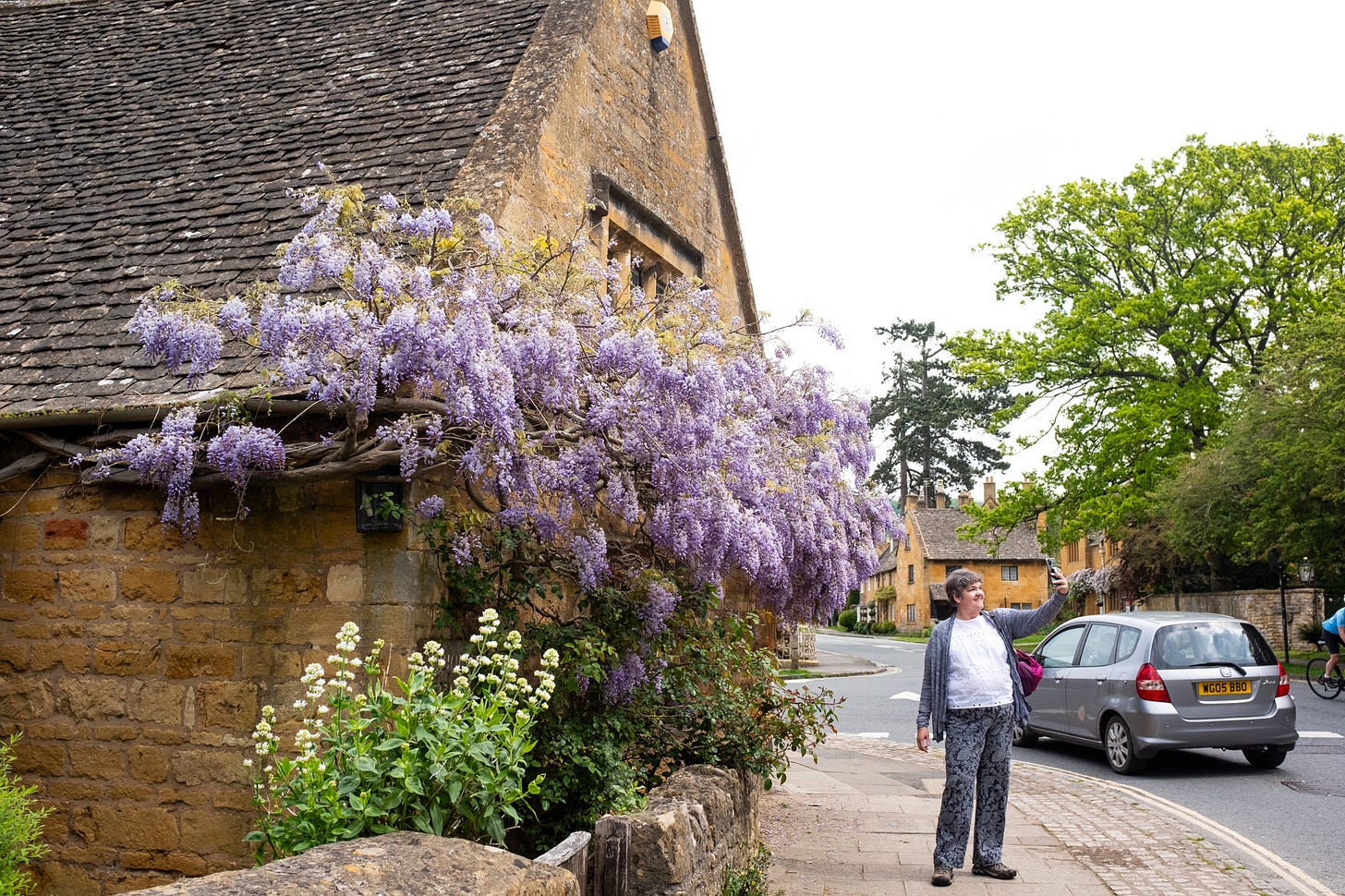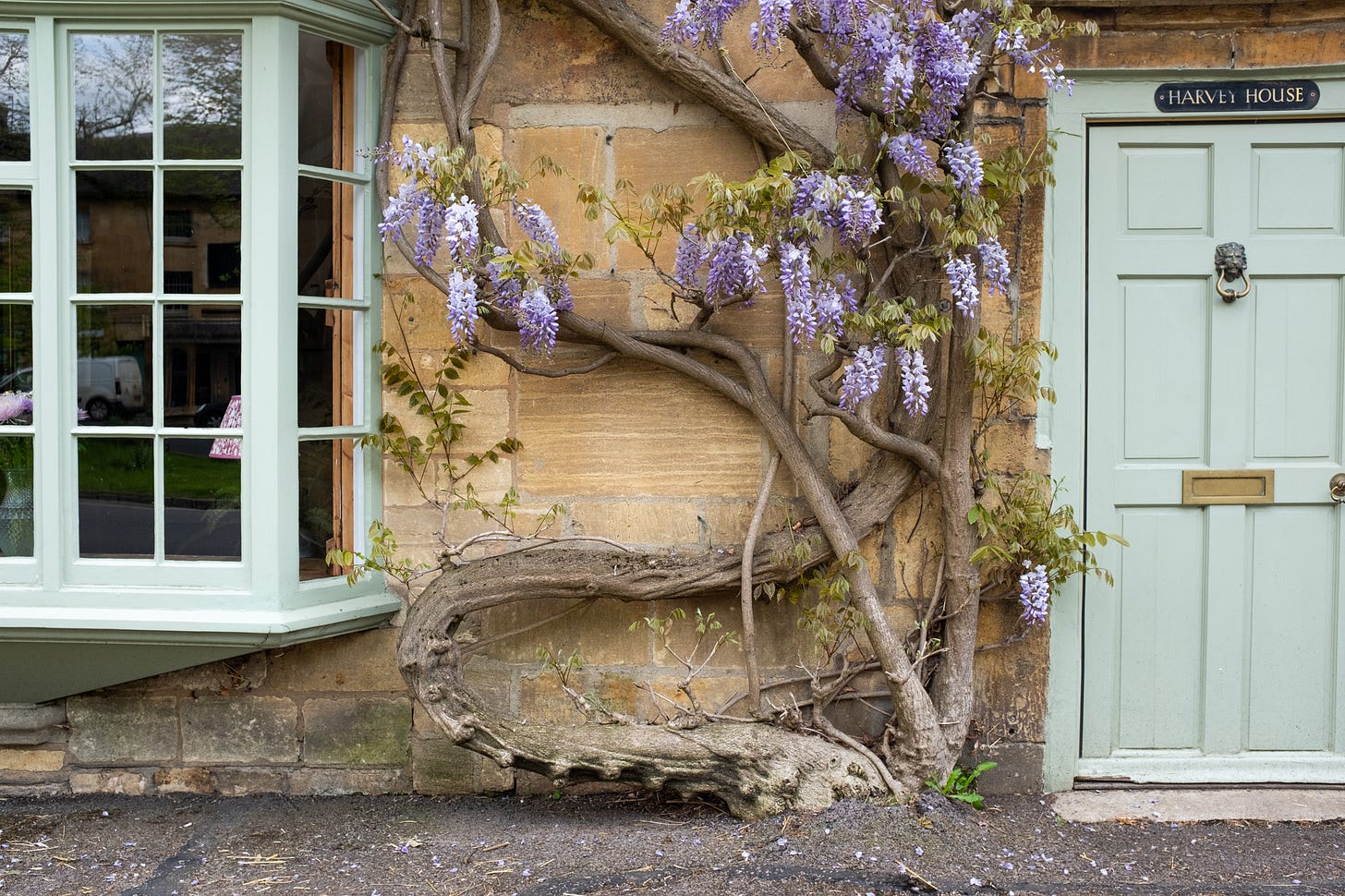The rain tumbled off the roof at Paddington, curtains of water drawing left to right and back again. I questioned my decision to be going hitchhiking, first thing on a Monday morning, in a rainstorm.
The train was busy and I was next to two Americans. The lady next to me was rake thin with pale skin, a melange tracksuit and a bumbag. The other had tight blonde curls, softly wrinkled skin and glasses. They discussed the dreams they’d had last night.
We came towards Charlbury on the edge of the Cotswolds. The lady with curly hair, leant forward across the table and with a twinkle of excitement, whispered to her companion, “It’s getting quainter!”
“What’s that?” Her friend replied.
“IT’S GETTING QUAINTER!”
“Oh yes. I was just thinking that. There are sheep.”
The train pulled into Moreton in Marsh. I followed the ladies as they tottered out of the station past a Landrover pulling a trailer with six clay pigeon traps then wandered into the centre of the small town. It was lively with tourists peering into the delicately painted windows of antique shops and tea rooms. The wisteria was in bloom and the street was lined with purple. It clung to the golden walls like fruiting vines. The ladies were right, it was definitely quaint.
Morton was built on a crossroads, the intersection of the Roman Fosse Way which ran from Exeter to Lincoln and the Oxford-Worcester road. I was taking the latter. It snaked out of the town and I took my place in front of the Wellington Aviation Museum, an unassuming single-storey barn “packed full of great stuff”, RAF trinkets, engines, typewriters and brass buttons. It was closed.
A car stopped within ten minutes.
Rod was driving. He had a bald head but for a long fiery tongue of red hair that ran from his forehead right down his back. Tattoos crept up towards it and his skin twinkled with piercings which jabbed through his nose and lips. There was a big bar through his ear cartilage. He had a word tattooed on his forearm to look like it had been scratched on. I couldn’t see what it said.
I got in the back, among various debris. Bea, who was in the passenger seat, said she’d never had a stranger in her car before. This was really weird. She watched too much true crime to want to pick up a hitchhiker and she’d never done it herself either. Rod had caught the odd lift.
Bea’s hair was a bright luminescent purple, wisteria purple, the same colour as the tattooed dragon on her right shoulder. It was curled up asleep.
They were going to the supermarket in Evesham, then going back to walk the dogs. They spoke to each other about it for a moment, in the way couples often do when you first get in, when it’s still awkward and strange. “Don’t want to take the old one out… It’ll refuse to move and I’ll be there for ages!”
They said they lived in Morton and I asked what they did there.
“Get out of it mostly!” Rob laughed, “There’s not much to do. You’ll have noticed there’s a train station and that’s about it.”
“And a Co-op,” I added.
“And a couple of antiques shops,” Bea concluded, “There aren’t even any busses out.”
Rod disagreed. There were one or two. But the conclusion remained, there was very little to do.
“Oh and a nice pub,” Rod remembered. “The Bell is what Tolkien based the Prancing Pony in Lord of the Rings on.”
I knew Tolkien lived in Oxford, but not that he was from Worcester. His brother Hilary had a farm in Evesham and when J. R. R. would visit they’d often meet at the Bell in Morton. The pub has a blue plaque now and a map of Middle Earth on the wall. I leant the town of Bree is also loosely based on Morton, with its “hundred stone houses” and curfew gate. Some think it was inspired by Morton’s 16th-century curfew tower where they’d lock petty criminals for the night.
Bea worked in childcare. It was charity work so there was no money in it. She said she got paid barely more than minimum wage. There had been challenges post-covid too. Many of the kids were learning to speak later and they had problems with anti-social behaviour.
They’d also been having trouble getting the numbers. Bea thought it was because birthrates were falling and there were just fewer kids. It was the same across the country. “People don’t wanna have kids,” she said, “It’s fair enough. Can’t make them. Sometimes wish we hadn’t had so many kids…!” She flashed Rod a glance. He wagged his head in tentative agreement.
Their oldest was 19. They agreed that meant they could occupy themselves nowadays, playing Minecraft or Roadblock. They knew everything there was to know about Star Wars. Rod said they could leave them in the same place, come back a week later and they’d still be there.
Rod worked in electrical engineering for phone companies. He worked on towers mostly and he wondered aloud about whether he should train to climb them. He hadn’t been up at height for years though. I told him about the free climber who picked me up who scaled huge cliffs with nothing but his own skill. “Yeah I haven’t got good enough grip for that…”
We crested Fish Hill and suddenly a huge plain swept in front of us. Bea said you could see five counties from here. Mottled fields gave way to hazy blue hills, punctured with church spires and the tiny distant oaks looked like the little balls of wool that gather on an old jumper.
Apparently there was a tower higher up on the hill from which you could see ten counties. Rod said some aristocrat built it. I later discovered it was built as a folly by the Countess of Coventry. She wanted to know if such a tower would be visible from her home in Worcester, 20 miles away. It was.
“Not the kind of tower you work on then?”
“No definitely not.”
We wound down the hill and into Broadway. I said my goodbyes, thanking Bea and Rod. We wished each other luck.
Broadway was busier than Moreton. I walked into town, under a cascade of wisteria.





